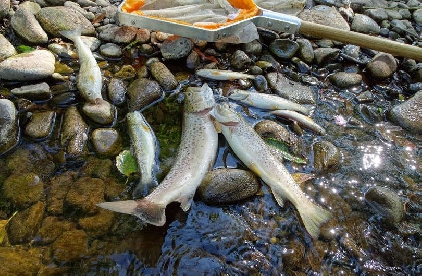
This time a year ago anglers like Dave Collins were beginning to feel confident about the recovery of the River Llynfi after a major pollution incident in the summer of 2016.
The incident had devastated fish stocks along sections of the Powys river, which joins the River Wye a few miles to the north.
Mr Collins and colleagues from Gwent Angling Society had been monitoring the Llynfi and, after vast winter rainfall the winter before last, clearing large pieces of debris from it. They also managed the tree canopy above to let more light in.
“We invested significant resources and time to maintain the bank and in-stream habitats,” said Mr Collins.
Fish were beginning to return, but all the society’s work was about to be undone.
Another major pollution incident, which is believed to have happened on July 31, 2020, wiped out more than 10,000 fish and other wildlife.
“We completed the work two days before everything was killed again,” said Mr Collins.
“We could see the fish population developing again – we had nurtured them.
It was absolutely soul-destroying.”
Mr Collins said there are three fisheries along the stretch of river affected by the 2016 and 2020 incidents, the latter of which environment body Natural Resources Wales (NRW) has been investigating.
Gwent Angling Society leases a small fishery from a farmer and owns a larger one a little downstream.
Mr Collins is the designated water bailiff, or river keeper.
“It was absolutely fabulous fishing habitat,” he said of the pre-2016 Llynfi.
“It contained a well-established, thriving and self-sustaining population of wild brown trout, grayling, bullheads and spawning salmon.
“When you kill a river, it’s just amazing the numbers of dead fish – staggering. You have essentially lost an eco-system.”
NRW was unable to mount a prosecution for the summer pollution incident of 2016 because it was reported days after it occurred, making it much harder to pinpoint the source.
However, there had been a smaller pollution spill on the Llynfi earlier in 2016 – and NRW on that occasion prosecuted a local anaerobic digester business, GP Biotec Ltd, for spreading organic matter during inappropriate times and unsuitable weather.
This caused nutrient levels to rise and then enter the river, affecting the water quality.
Mr Collins said different pollutants affected a river in different ways.
Generally speaking, there is a rapid depletion of oxygen in the water.
“The longer it occurs, the more significant its impact,” he said.
“There are also effects on the invertebrate population, which fish and birds eat.”
Mr Collins said herons, kingfishers, dippers and otters live on or near the Llynfi.
Fish do find a way of repopulating a river though.
Mr Collins said trout and grayling will come upstream from the Wye, while smaller salmon head downstream along the Llynfi when water levels are high and fast-flowing.
This process reinforces itself every year, and the population overall begins to stabilise.
Mr Collins said he and his colleagues reckoned it would take 10 years to fully restore the fishing habitat after the 2016 incident.
He said anglers wanted reassurances that things wouldn’t go back to square one again after last year’s hammer blow.
“There is this sword of Damocles hanging over you,” said Mr Collins, a 75-year-old former research scientist who lives across the border in Herefordshire.
“We don’t think it that it (the river) can be protected, or that it won’t happen again.
“Throughout the UK we have a massive ‘diffuse’ pollution problem from pigs, poultry, cows and humans.”
He said the UK and Welsh Governments should provide more money to the Environment Agency and NRW to investigate river pollution incidents.
It’s not just anglers who have a stake in rivers. Where the Llynfi meets the Wye, at Glasbury, is popular area for swimmers and canoeists.
Local film-maker Eamon Bourke told BBC magazine Countryfile last year how he headed upstream with a camerawoman, Antonia Salter, to record the dead fish in the aftermath of the July 31 incident.
“It’s grotesque that anyone could pollute a stretch of river that is a recreational place for the local community and tourists,” he said.
“This can’t be allowed to happen. I want to see a prosecution and I really want proper, regular monitoring of that tributary going forwards so that we know what’s going on.”
The River Llynfi is a site of special scientific interest and located within a special area of conservation – the latter designation in particular providing a high degree of protection.
The Local Democracy Reporter Service asked NRW what stage of the investigation it was at regarding last summer’s incident, what the results of any chemical or biological analysis of the water had found, and what assurances it could give about preventing further incidents.
Ann Weedy, NRW’s operations manager for Mid Wales, said: “We have collected all the evidence relevant to this case and we are finalising a case file which will be submitted to our legal team for review.
“We cannot at present release any further details regarding the case which might undermine any potential legal proceedings.”
She confirmed that water samples underwent chemical and biological analysis, but that NRW couldn’t comment due to the investigation and potential legal proceedings.
In answer to the question about preventing future incidents, she said: “Preventing pollution affecting the people and wildlife of Wales is a big part of the work we do at NRW, but everyone has a duty to ensure their practices don’t cause significant adverse effects on our rivers.
“Where an incident has caused serious damage to a river, we will investigate the matter and bring enforcement action where needed.”
You might think that anglers might be starting to consider another pastime, but not Mr Collins.
“Absolutely not – I’m addicted,” he said.


